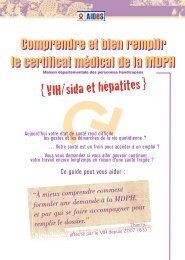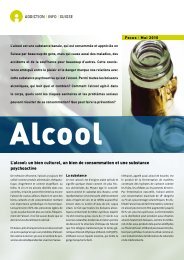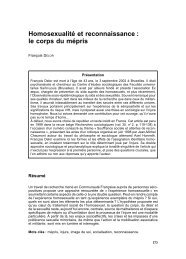Care and support for people living with HIV/AIDS
Care and support for people living with HIV/AIDS
Care and support for people living with HIV/AIDS
Create successful ePaper yourself
Turn your PDF publications into a flip-book with our unique Google optimized e-Paper software.
Report on the global <strong>HIV</strong>/<strong>AIDS</strong> epidemic – June 2000tion to question their husb<strong>and</strong>s about their extramarital encounters, negotiate condomuse or refuse to have sex. A study in Zambia confirmed how much subserviencein marriage, often rein<strong>for</strong>ced by violence, can compromise women’s abilityto protect themselves. Fewer than a quarter of women in the study believed thata married woman could refuse to have sex <strong>with</strong> her husb<strong>and</strong> even if he had beendemonstrably unfaithful <strong>and</strong> was infected. And only 11% of the women thought awoman could ask her husb<strong>and</strong> to use a condom in these circumstances.According to a large number of studies in many countries <strong>and</strong> on all continents,between a third <strong>and</strong> a half of married women say they have been beaten or otherwisephysically assaulted by their partners. From Cambodia to the Gaza Strip, fromChile to Switzerl<strong>and</strong>, studies in country after country show that violence <strong>with</strong>in marriage<strong>and</strong> regular partnerships is frighteningly common. In Ug<strong>and</strong>a, 41% of men intwo districts said they beat their partners.There is often a thin line between physical violence <strong>and</strong> sexual coercion. In a largestudy in the Indian state of Uttar Pradesh, 17% of men said they beat, slapped,kicked or bit their wives, <strong>and</strong> 7% said they used physical <strong>for</strong>ce to make their wiveshave sex <strong>with</strong> them. Aggravating the risk to wives, men who used <strong>for</strong>ce to get sexat home were far more likely than other men to report extramarital sex <strong>and</strong> sexuallytransmitted infection.Box 9. Rape in warThe military can have a powerful impact on the general population’s exposure to <strong>HIV</strong>,whether through commercial sex <strong>with</strong> civilians or through rape in times of conflict.Rape, a weapon of war since time immemorial, is most often used to humiliate <strong>and</strong>control the behaviour of civilian populations or to weaken an enemy by destroyingthe bonds of family <strong>and</strong> society. It may take place in front of other family members.During the last century, hundreds of thous<strong>and</strong>s of women were raped in war.According to the International Planned Parenthood Federation, during Bangladesh’snine-month fight <strong>for</strong> independence in 1971, at least 250 000 women were raped, ofwhom 10% became pregnant as a result. In South-East Asia, the United NationsHigh Commissioner <strong>for</strong> Refugees has reported that 39% of Vietnamese boat womenaged 11–40 were abducted <strong>and</strong>/or raped at sea in 1985. In a r<strong>and</strong>om sample of 20Ethiopian refugees in a camp in Somalia in 1986, 17 knew someone in their village<strong>and</strong> 13 knew someone in their family who had been raped by the Ethiopian militia. Ina letter dated 13 March 2000, the United Nations special rapporteur on violenceagainst women called <strong>for</strong> investigations into allegations of gang rape <strong>and</strong> murder ofwomen <strong>and</strong> girls by soldiers in Sri Lanka. And the list goes on.Women raped by military personnel suffer not just immediate physical injury <strong>and</strong> therisk of pregnancy but are also exposed to a far higher risk of <strong>HIV</strong> <strong>and</strong> other sexuallytransmitted infections than they would be through other unprotected sex, not just–––>50











